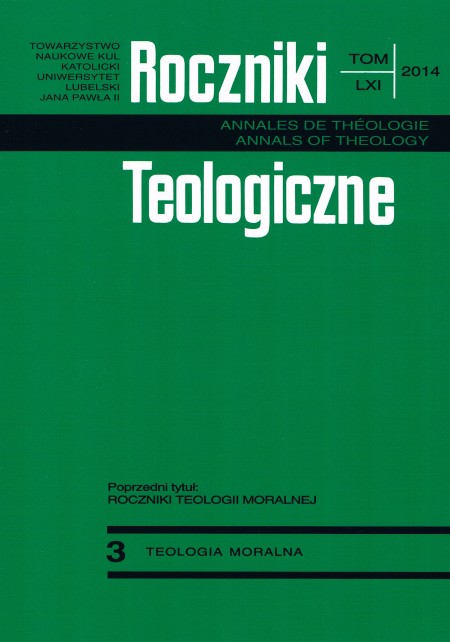Ciąża ektopowa z perspektywy bioetycznej
Ectopic pregnancy from the bioethical perspective
Author(s): Józef WróbelSubject(s): Christian Theology and Religion
Published by: Towarzystwo Naukowe KUL & Katolicki Uniwersytet Lubelski Jana Pawła II
Keywords: ectopic pregnancy; abortion; human embryo
Summary/Abstract: One of the difficult cases the biomedical practice encounters is concerned with the ethical conduct with ectopic pregnancy (eccysis). The conviction is fairly common that ectopic pregnancy has to be terminated as soon as possible, as such an intervention gives a very good prognosis and allows minimizing the risk of maternal death. In urgent situations the developing embryo is removed by surgical intervention. In the case of early treatment of ectopic pregnancy methotrexate is used rather than surgery. In the practical dimension, however, such an action is directed against the embryo, effecting the destruction of it. In the case of an early detection of such a pregnancy and the mother’s good health it is also possible to refrain from immediate intervention and to wait and carefully observe the situation. This is because cases of an ectopic pregnancy ending in delivering a live and healthy baby are fairly common. From the Christian point of view action directed immediately against the human fetus is excluded. From the moral point of view detecting an immediately threatening rupture of the Fallopian tube or the cervix, usually after 7-10 weeks of gestation, is the most difficult. Removing the affected tissue or organ (or a part of it) where the embryo has implanted is morally acceptable. The source of threat to the mother is not the embryo, but the changes occurring in the tissue of the organ where it is developing. It is necessary to remove the tissue and it is the tissue that is the object of the surgical intervention. Terminating the pregnancy and the death of the baby is a side effect of the intervention that cannot be avoided. Such a surgical intervention is then assessed from the perspective of two classical moral principles: the holism principle and the principle “voluntarium indirectum” (an act with a double result). This interpretation is affirmed by statements of the Magisterium.
Journal: Roczniki Teologiczne
- Issue Year: 61/2014
- Issue No: 03
- Page Range: 117-133
- Page Count: 17
- Language: Polish

